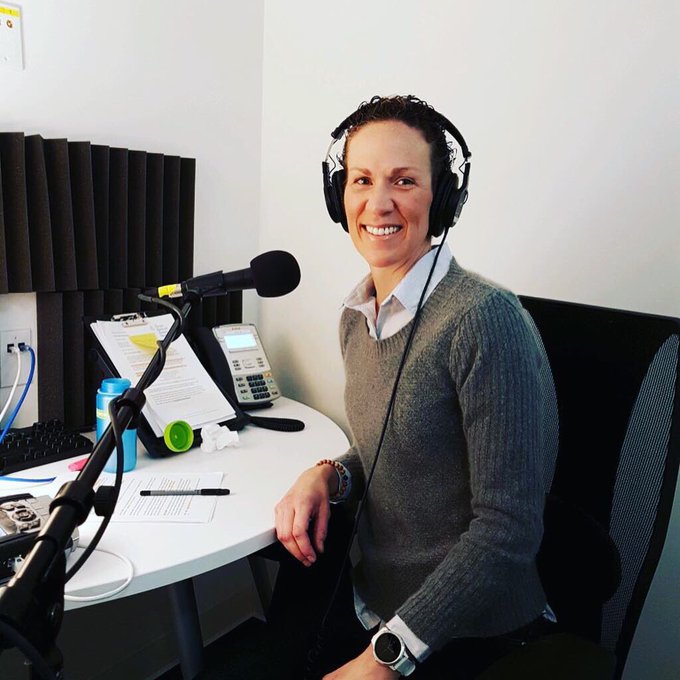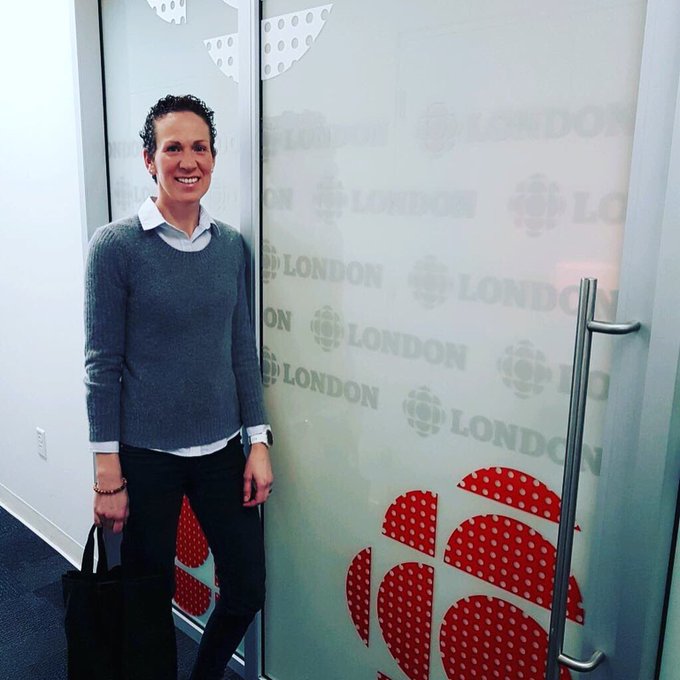Trust of girls
with absolute power?
cancer can be cured without chemo or radiation therapy. And has been ongoing for
30 years providing inexpensive Real n total cures these ghouls in white coats be after thy money
Like vampires, they suck money instead of wit.
Why a mom with cervical cancer needs women — and their doctors — to hear her story
Karla Van Kessel had regular Pap smears but was still diagnosed with Stage 4 cervical cancer last year
Karla Van Kessel and her family, from left, Tom Whitmill, Karla Van Kessel, Rob Whitmill, Ben Whitmill. Van Kessel was diagnosed with Stage 4 cervical cancer last year. (Lindsay Davis)
Karla Van Kessel followed all the rules: She exercised, ate well and got regular checkups, including Pap smears that screen for cervical cancer.
So when the 42-year-old mother of two from London, Ont., was diagnosed with late-stage cervical cancer last year, it came as a shock.
"I said, 'How could this happen?'" Van Kessel recalled of her conversation with the oncologist after she was diagnosed.
"I've been screened my whole life. Here I am in your office with Stage 4 and they just kind of looked at me and said, 'Yeah, this happens.' And I said, 'What do you mean this happens? Who knows that this happens? Women don't know. Do GPs know? I had no idea.'"
Van Kessel says she was failed by the medical system, and that failure set her on a mission to share her story as a way to help others. Her experience is a cautionary tale about the limitations of Pap smears and the importance of recognizing the symptoms of cervical cancer, as well as the need to understand what is in your medical records.
"My hope is that with education and awareness, my devastating diagnosis will not happen to any other women," she told CBC's Dr. Brian Goldman, host of White Coat, Black Art.
Today, cervical cancer is the fourth most common cancer in women worldwide. Experts believe better screening and widespread use of the human papillomavirus (HPV) vaccine could one day change that.
Cervical screening aims to prevent invasive cancer from developing by detecting abnormalities caused by HPV. It is estimated that more than 70 per cent of sexually active Canadian men and women will be infected with HPV at some point in their lives. While most HPV infections go away on their own, the virus is also associated with abnormal changes to the cervix that can develop into cancer if left untreated.
Cases of cervical cancer have dropped steadily in Canada, thanks to wider use of Pap screens to detect lesions.
But Van Kessel, who was diligent about getting screened, wants women to know screening alone is not enough, and they and their doctors should be aware of potential symptoms.
In 2017, she started to experience intermittent bleeding between her menstrual cycle, painful intercourse and severe pelvic pain.
Her family doctor ordered a pelvic ultrasound, which came back normal, but did not do a pelvic exam.
She was referred to a gynecologist, but would have to wait more than six months for an appointment.
As the months passed, the pain in her lower back, hips and down both legs worsened. She slipped into depression as she tried desperately to figure out what was causing the pain.
An avid runner and athlete, Van Kessel cut back on exercise. It didn't help. Neither did opioid painkillers, cannabis or treatments such as massage and chiropractic care.
While cervical screening is not perfect, it does save lives, Dr. Joan Murphy of Cancer Care Ontario tells CBC's Dr. Brian Goldman. (Amina Zafar/CBC)
That summer, in 2017, she was due for another Pap smear — in Ontario screening is recommended every three years. By coincidence, she had the Pap about two weeks before she was to finally see the gynecologist.
Although she told the gynecologist she didn't yet have the results, Van Kessel later discovered the gynecologist indicated on her record that the Pap smear had come back as normal. The specialist told her she couldn't have cervical cancer and suggested her pain could be musculoskeletal.
Soon after, Van Kessel's family doctor informed her the Pap result was ASC-US, which stands for atypical squamous cells – undetermined significance. It means some cells don't look completely normal but are nothing to worry about.
The physician assured her it was just some "weird cells," and they would follow up later with a second Pap.

00:00 01:00
The second screening, done in January 2018, showed cells that were so abnormal Van Kessel was immediately referred for a biopsy.
The cervical biopsy took place the next month. She knew something was amiss when the doctor asked her if she was feeling well. When she listed her symptoms, "his eyes widened and his jaw dropped," she said.
Van Kessel says she knew for certain, in that moment, that she had cervical cancer.
"My world stopped," she said. "It was an awful feeling, but I knew all along and nobody was listening."
Scans showed a four-by-five-centimetre mass that had destroyed her cervix and had spread to lymph nodes and her bladder. It was Stage 4A cancer.
Van Kessel underwent five weeks of chemotherapy, daily radiation and brachytherapy, an internal radiation therapy. The treatment eventually sent the cancer into remission, but only temporarily.
Unforgettable moment
And while Kessel was dealing with cancer and all the pain that entails, she received some shocking news.
When a friend who is a cancer specialist reviewed her medical records, she discovered Van Kessel's family doctor had missed something crucial.
Her Pap smear in July 2017 was not ASC-US. It was ASC-H.
That distinction is critical, since ASC-H means there are atypical squamous cells that look abnormal and could be a high-grade or dangerous form of cancer.
"She said, 'You were supposed to go for biopsy and you weren't referred. I just I hung up the phone and on the soccer field I cried ... Had I been referred, my prognosis would have been much better."
Van Kessel, second from left, says it's important for people to see and understand what's in their medical records. (Lindsay Davis)
It's why she now advocates for men and women to check their own medical files. Van Kessel said she jokes with her husband that their eight-year-old son would have known what to do since the pathologist's report said she was supposed to go for a biopsy after the first abnormal Pap that was misread by her family doctor. Van Kessel believes that had she had access to the pathologist's report initially, she would have been been able to flag the error.
Van Kessel complained to the College of Physicians and Surgeons of Ontario about her family doctor and the first gynecologist who saw her. The college reprimanded the GP and ordered her to "engage in professional education in the Cancer Care Ontario Cervical Cancer Screening Guidelines."
It found the gynecologist had acted appropriately.
'Huge overreliance'
Van Kessel believes there was a "huge overreliance" on a Pap smear in her case, particularly since she had other symptoms.
Dr. Joan Murphy, clinical lead of the Cancer Care Ontario Cervical Screening Program, said it can be difficult for family physicians or young clinicians to recognize cervical cancer, especially since some have never seen it.
"The reality is, if a cervix is looking abnormal or if the patient has symptoms that could be arising from cervical cancer, a Pap smear is notoriously unreliable," said Murphy, a gynecologic oncologist.
In those cases, doctors should perform a thorough gynecological examination and colposcopy. It's a procedure that uses a lighted magnifying instrument that allows a more detailed look at the cervix and to get a biopsy.
She stressed that while screening is not perfect, it is vital and saves many lives. The danger comes when physicians rely on screening too heavily and get complacent.
It was an awful feeling, but I knew all along and nobody was listening.- Karla Van Kessel
A recent, small study done at the London Regional Cancer Program in southern Ontario seems to back that up.
Researchers interviewed 38 women treated for advanced cervical cancer between 2010 and 2012.
The team found patients were in "disbelief" that the cancer could occur in young, healthy women, and that there was complacency on the part of doctors based on the success of Pap screening programs. For example, when a family doctor sees normal Pap results, there's often a tendency to take cervical cancer off the table in considering a diagnosis, said Dr. David D'Souza, the study's lead author and a radiation oncologist with the London Regional Cancer Program.
Murphy said D'Souza's findings were consistent with provincial results in Ontario and elsewhere.
To help counter complacency, Van Kessel and Murphy strongly support HPV testing to improve cervix screening. An HPV test offers another way to catch cervical cancer in its early stages by looking for DNA from high-risk types of HPV that have been linked to cervical cancer.
'Better preventative test'
Countries such as Australia have introduced HPV testing as part of their cervical screening programs. In the United Kingdom, it's been rolled out in Wales.
In February, data collected from screening more than 400,000 women with HPV testing suggested it was 40 per cent more sensitive at detecting precancerous lesions, said Sophia Lowes, spokesperson for Cancer Research UK.
"It's a kind of better preventative test," she said.
In Ontario, HPV tests cost about $100. In the 2017 provincial budget, the government announced it would fund the implementation of HPV testing as the primary cervical screening. Cancer Care Ontario is working to cover HPV testing as an insured service, as are some other provinces and territories.
The vaccination of girls for HPV is also expected to drive down the rate of cervical cancer in Canada. The World Health Organization has called for a global effort to eliminate cervical cancer, and says the HPV vaccination is critical for reaching that goal.
Meanwhile, Karla Van Kessel hopes her story will raise awareness among women and their physicians.
In February, Van Kessel was told that her cancer had returned and spread. She is undergoing more chemotherapy to reduce her pain. Her prognosis is poor, but she is looking into experimental treatments.
POPULAR NOW
-
1
WHY A MOM WITH CERVICAL CANCER NEEDS WOMEN — AND THEIR DOCTORS — TO HEAR HER STORY
-
2
NEWS FLASH: BREAKFAST IS NOT THE MOST IMPORTANT MEAL OF THE DAY!
-
3
HOW THE TRADITIONAL MAORI HAKA BECAME A CENTRAL PART OF NEW ZEALAND'S NATIONAL IDENTITY
-
4
THIS 88-YEAR-OLD EX-SENATOR IS LETTING 3 TEENAGERS RUN HIS PRESIDENTIAL CAMPAIGN
-
5
'APARTNERS' IN CRIME: WHY MORE CANADIAN COUPLES ARE CHOOSING TO LIVE SEPARATELY
DISCOVER MORE FROM CBC
14:22 26:29





















COMMENTS
The Pap came back as normal, the cells were "precancerous" and I was scheduled for a Conization, the removal of a portion (think, top layer) of my cervix, and told to have a pap every 6 months for two years in case of re-occurrence.
In the US, we often go to a GP, or an OB/GYN, but sometimes you need a ... » more
"Her Pap smear in July 2017 was not ASC-US. It was ASC-H.
That distinction is critical, since ASC-H means there are atypical squamous cells that look abnormal and could be a high-grade or dangerous form of cancer."
Would not the Pap smear report that went to her GP also flag the ASC-H result as abnormal and recommended further screening?
This article did not even indicate the false positive and false negative rates of Pap smears. A quick google search reveals that the false positive rate is approximately 10% and the false negative rate is at least 20%. Those are alarming numbers; being flagged as positive means being exposed to uncomfortable, stressful and often dangerous 'treatments'. But ... » more
If you don't understand what a result means, ask your doctor. But also go online and read about the results. There are many reputable medical web sites run by hospitals like the Mayo Clinic and Cleveland Clinic.
Had this person received a copy of her test report, she could have learned of the mistake much sooner.
Miracles ... » more